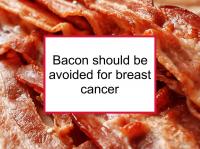Diets high in bacon and other processed meats have been linked in population studies to higher risks of leukemia, stomach cancer, colorectal cancer, esophageal cancer, brain cancer, lung cancer, bladder cancer, pancreatic cancer, and prostate cancer. Processed meats include those that are salted, cured, smoked or preserved.
This includes hot dogs, sausage, ham, bologna, other sandwich or luncheon meats, pâtés, salami, pepperoni, and beef jerky, to name a few. Fresh pork is covered in another webpage.
Processed meats linked to breast cancer risk factors
Processed meats tend to have high saturated fat content. Sodium nitrite and related compounds are normally added to processed meats to preserve their freshness and coloring. Sodium nitrite has been shown to react with chemicals in the stomach to produce nitrosamines, which are known to be cancer-promoting.
One study reported that canned meat can be a significant source of exposure to the breast carcinogen bisphenol A (BPA).
In addition to their saturated fat, nitrite and BPA content, the carcinogenic potential of processed meats appears to be related to the effects of frying or broiling, which have been shown to produce mutagenic compounds such as heterocyclic amines (HCAs) and polycyclic aromatic hydrocarbons (PAHs). One study reported that fried bacon had a higher level of HCAs than fried pork, fried beef and fried chicken.
Breast cancer-related effects of eating bacon
A 2023 study reported that intake of fried cured bacon appeared to awaken dormant tumor cells, causing them to resume malignant proliferation in a mouse model of breast cancer. Another study determined that the cholesterol metabolite produced in bacon drippings promoted metastasis in a mouse model of breast cancer more so than lard (the use of which has been linked to greater breast cancer risk in population studies). A study that examined the risks of recurrence and death following diagnosis with early stage breast cancer found that both the risk of recurrence and the risk of death were positively correlated with the consumption of bacon, especially for premenopausal women.
A large U.K. study reported that both premenopausal and postmenopausal women with the highest processed meat intake had the highest risk of breast cancer. Another study found that higher red meat consumption during adolescence was associated with increased risk of premenopausal breast cancer in adulthood. A study of tissue removed from healthy women undergoing breast reduction surgery found that the levels of DNA adducts (which are associated with cancer development) in the breast tissue was correlated with the women's consumption of fried meat, beef and processed meat.
High intake of animal fats has been linked in several studies to increased breast density, a risk factor for breast cancer and recurrence. One study reported found that consumption of well-done or fried meat (including bacon) appeared to increase the risk of breast cancer in a dose-dependent manner.
Additional comments
Generally speaking, bacon-like products made from turkey, beef, and combinations of pork and turkey also contain sodium nitrite and form carcinogenic nitrosamines when consumed, however the levels tend to be lower than traditional bacon.
Sources of information in this webpage
The information above, which is updated continually as new research becomes available, has been developed based solely on the results of academic studies. Clicking on any of the underlined terms will take you to its tag or webpage, which contain more extensive information.
Below are links to 20 recent studies concerning this food and its main components. For a more complete list of studies, please click on processed meat.
